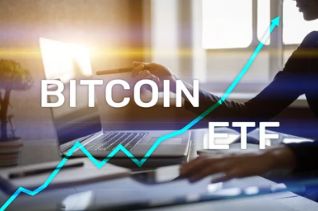The debate surrounding the suitability of Bitcoin Exchange-Traded Funds (ETFs) in the ever-evolving cryptocurrency landscape continues to capture the attention of investors, enthusiasts, and industry experts alike.
Seen as a potential catalyst for mainstream adoption, this financial instrument raises fundamental questions about the future of the cryptocurrency market.
For Bitcoin ETF
Improved accessibility: Opening the cryptocurrency market to the public
One of the main arguments in favor of a Bitcoin ETF concerns the concept of improved accessibility. Proponents argue that Bitcoin ETFs can attract both institutional and retail investors to the cryptocurrency market by providing a regulated and simple investment vehicle. A potential influx of capital could breathe new life into the space, driving up prices and creating a more diverse investor base.
Legitimacy and mainstream adoption: Bridging the gap.
For many, the approval of a Bitcoin ETF by regulators marks an important step toward legitimacy and mainstream adoption. In a world of finance that is often skeptical about the uncharted territory of cryptocurrencies, ETFs can serve as a bridge between the worlds of traditional finance and cryptocurrencies. A stamp of approval from regulators could increase liquidity and stability by attracting institutional investors.
Market Growth: Ripple Effects on the Entire Ecosystem
Enthusiasts argue that Bitcoin ETFs could be a catalyst for significant market growth. ETFs can serve as a conduit to a broader range of financial products and services in the cryptocurrency space, providing a convenient on-ramp for traditional investors. This, in turn, can foster innovation and progress across the entire ecosystem.
Bitcoin currently trading at $ 44,239 territory on the daily chart: TradingView.com
Case Against Bitcoin ETF
Market Manipulation Concerns: The Wild West
Detractors have expressed concerns about the potential for market manipulation if a Bitcoin ETF is introduced. The relatively unregulated nature of the cryptocurrency market, combined with the sheer volume of institutional investors, has led to growing concerns that prices could be manipulated to benefit a few. These concerns highlight the need for a strong regulatory framework to protect against such practices.
Principle of Decentralization: Navigating the Fine Line
Central to the psyche of many within the cryptocurrency community is the idea of decentralization and autonomy from traditional financial systems. Critics argue that Bitcoin ETFs could compromise these principles by introducing regulatory oversight and institutional influence. Striking a balance between mainstream adoption and maintaining the decentralized nature of cryptocurrencies remains a significant challenge.
Volatility and Speculation: Taming the Cryptocurrency Roller Coaster
Cryptocurrency markets are famous for their volatility, and skeptics suggest that the introduction of Bitcoin ETFs could worsen this problem. As speculation increases and short-term price fluctuations are expected, concerns about market stability and investor protection are growing. Addressing these challenges is critical to the long-term sustainability of cryptocurrency markets.
conclusion
As the debate rages, the question of whether the cryptocurrency market will be better off with or without a Bitcoin ETF remains unanswered. The dichotomy between those who see this as a positive force for mainstream adoption and market growth and those who are wary of potential negative impacts highlights the complex nature of the cryptocurrency ecosystem.
Ultimately, the trajectory of the cryptocurrency market will depend on the ability of stakeholders to address these challenges and shape a future that embraces both innovation and responsibility.
(Analysts are confident that all spot Bitcoin ETFs will be approved simultaneously on January 10th. The U.S. Securities and Exchange Commission (SEC) has set a deadline of January 10th for approving applications for such funds.)
Featured image from Shutterstock

